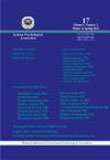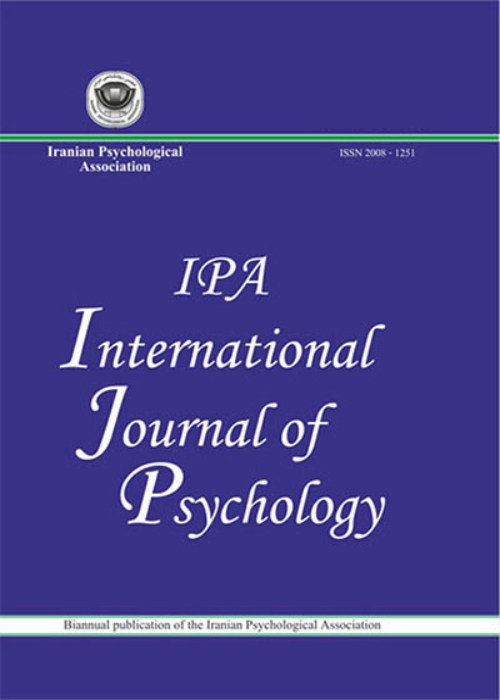فهرست مطالب

International Journal of Psychology
Volume:11 Issue: 1, Winter-Spring 2017
- تاریخ انتشار: 1396/02/16
- تعداد عناوین: 8
-
-
Investigation of the Causal Relationship between Academic Motivation and Academic Engagement with the Mediating Role of Achievement Emotions and Academic Hardiness in StudentsPage 1The aim of this study was to test the causal relationship between academic motivation and academic engagement with mediating role of achievement emotions and academic hardiness. 280 first year female high school students of Dezful city were selected by multiple stage random sampling. The instruments used in this study was the Revised Academic Hardiness Scale (2005), Tinio's Academic Engagement Scale (2009), Academic Motivation Scale (1989) and Pekrun's Achievement Emotion Questionnaire (2002). The current study plan was descriptive-correlative and the fitness of the proposed model was examined through structural equation modeling. The indirect effects were tested by using bootstrap procedure. The findings indicated that model fitted the data and all the direct paths were significant except external motivation to negative emotions. Also, all the indirect paths were significant.Keywords: academic engagement, academic motivation, achievement emotions, academic hardiness
-
The Interactive Effects of Attributional Style and Experience of Failure on Children's Subsequent Mathematical Word Problem SolvingPage 3The reformulated learned helplessness theory predicts that the attributional style interacts with negative academic events, and results in performance deficits in future tasks. The aim of the present study was to evaluate the effects of experiences of failure on mathematical word problem solving performance and the moderating effect of the attributional style among students. The study was conducted on 80 female sixth grade students, 40 were chosen to test the most optimistic attributional style and 40 to have the most pessimistic, based on their scores in the attributional style questionnaire (ASQ). Employing a 2 × 2 factorial design with factors of attributional style (optimistic vs. pessimistic) and experience of failure (failure vs. success), half of the participants solved easy and the other half solved hard mathematical word problems in the first stage of the experiment. In the second stage, participants of all groups solved the same set of medium problems at the same time. The two-way ANOVA showed significant effects of the attributional style and experience of previous failure. Moreover, among those students who failed in the first step, students with optimistic attributional styles outperformed those with pessimistic attributional styles. It appears that individuals who experience failures in a specific domain are vulnerable to future failures, and having an optimistic attributional style results in higher performance in solving problems. The most striking result to emerge from the data is that performance outcomes are more likely to be a function of how we explain and respond to failures as opposed to being based on our explanations for success.Keywords: attributional style, failure, problem-solving performance, learned helplessness
-
Page 5The aim of the present study was to explore the correlation between personality type, social trust and social desirability in homeless adolescents living in Zahedan Welfare Organization hostels. The descriptive-correlational method was used. Through stratified random sampling, 92 adolescents aged 12 to 18 years old were selected and studied via three questionnaires including the Social Acceptability Scale, the Social Trust Scale (researcher-made) and the NEO Personality Type (Extraversion Subscale). For data analysis, the Pearson correlation coefficient and simple regression were used. The results indicated that there was a significant positive correlation between extrovert/introvert personality types and social desirability. Additionally, it was revealed that there was a significant positive correlation between social trust and social desirability of adolescents. The regression analysis showed that extrovert and introvert personality types and social trust can predict social desirability.Keywords: personality type, social trust, social desirability, homeless individuals
-
Page 53There is no doubt that the educational process consists of more than one or two factors. Several scholars maintain that it is important to put the emphasis on the role of psychological factors on academic performance. This study was an attempt to represent a pattern of correlations, through Structural Equation Modeling, among optimism, locus of control and academic achievement as well as the mediating effect of school satisfaction. Five-hundred and ten students, out a total population of the senior high-school (pre-university) male students, were selected randomly through cluster sampling. Data was collected through a set of questionnaires including: (1) Life Orientation Test-Revised Scale (Scheier &Carver, 1992), (2) School satisfaction sub-scale adopted from Satisfaction with Life Scale (Huebener, 1994), and (3) Internal-External Locus of Control Scale (Rotter, 1966). Data was submitted to a diagrammed structural equation model with its prerequisite exploratory factor analysis. The outcomes indicated that: (a) there is a bidirectional relationship between optimism and locus of control, (b) school satisfaction mediates the relationship between optimism and academic achievement, (c) the direct effect of school satisfaction on students academic achievement and the indirect effect of optimism on academic achievement through the mediating effect of school satisfaction was significant, and (4) there is no significant effect of locus of control on academic achievement while the mediating effect of school satisfaction is taken into account. The goodness of fit index indicated that the proposed diagrammed model is appropriate.Keywords: academic achievement, locus of control, optimism, school satisfaction
-
Page 98The current research study aimed at exploring the relationship among self-actualization (SA), creativity, emotional intelligence (EI), language, and academic achievement in gifted high school students. A sample of 77 female students studying at a high school for gifted students was selected to complete three questionnaires about self-actualization, creativity, and emotional intelligence, respectively. To analyze data the Pearson correlation coefficient was applied as a statistical procedure. The analysis of the collected data revealed that firstly, there was a significant positive relationship between the participants SA and creativity; the highly self-actualized individuals were highly creative as well. Secondly, there was a significant positive relationship between SA and participants EI, i.e., those whose score were high in SA were also highly emotionally intelligent; and lastly, it was revealed that there was a significant positive relationship between creativity of the participants and their EI. This means that the more creative an individual is, the more emotionally intelligent he or she will be. In addition, the results showed that while there was a significant positive relationship between creativity and participants language achievement, there was no significant relationship among other variables in relation to participants language and academic achievement. This significant positive relationship meant that highly creative participants had better grades in language achievement in comparison with other gifted participants.Keywords: Creativity, emotional intelligence, gifted student, language, academic achievement, self-actualization
-
Page 123The present study aims at examining the effects of moderating variables on the association between extraversion and identity styles. A quantitative research method (descriptive and survey) was employed. The sample included high school students (n=380) aged 17 and 18. Data was collected through self-administered questionnaires. Hierarchical regression analyses were used. In the first stage, the relationship between extraversion and normative style was significantly moderated by the level of education (β= .10, pKeywords: Extraversion, Identity styles, Moderating Variables
-
Page 150This study examined the relationships between intelligence, moral identity and prosocial moral reasoning with the mediating role of moral identity. From the population of undergraduate university students of Salman Farsi University of Kazerun, 245 students (163 female and others male) were selected by convenience sampling. They completed the questionnaires for the assessment of general intelligence (Cattell, 1957), moral identity (Aquino & Reed, 2002), prosocial moral reasoning (Carlo, Eisenberg, & Knight, 1992) and social desirability (Reynolds, 1982). Lie/nonsense responding and social desirability were controlled from correlations by the partial correlation method. The findings showed that there were positive and significant relationships between intelligence, prosocial moral reasoning and internalization subscale of moral identity (pKeywords: intelligence, moral identity, prosocial moral reasoning
-
Page 182Studies have shown that early life events affect physiological, psychological and social functioning and are related to a wide range of psychological problems in adulthood. The main objective of this study was to evaluate the psychometric properties of the Persian version of the Early Life Events Scale (ELES) based on the Item Response Theory (IRT) and the Classical Theory of Measurement in an Iranian population. The participants consisted of 400 students of universities in Tehran at all academic levels. Confirmatory and exploratory factor analyses were used to assess the construct validity of the ELES. Three factors were extracted from the exploratory factor analysis, and the confirmatory factor analysis confirmed the accuracy of the extracted factors. As the Cronbachs alpha coefficient always underestimates the reliability value, the ordinal theta and R software were used to assess the reliability of the scale and the results showed that the scale has a good reliability. To evaluate the accuracy of the items, determine their strengths and weaknesses and ultimately assess their quality and remove inappropriate items, the scale items were analyzed based on the IRT and the Classical Theory of Measurement using MULTILOG; the results showed that all the items are of a good quality in terms of threshold values (credibility), informative value and accuracy and that no items need to be changed or removed.Keywords: The Early Life Events Scale, Validity, Reliability, Factor Analysis, Item Response Theory (IRT)


